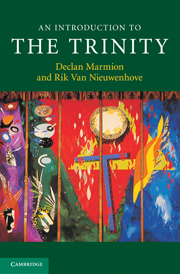Book contents
- Frontmatter
- Contents
- Abbreviations
- Acknowledgements
- 1 Introducing trinitarian theology
- 2 The Trinity and its scriptural roots
- 3 The doctrine of the Trinity: its emergence and development in the life of the Christian community
- 4 Theology of the Trinity from Richard of St Victor to the Reformation
- 5 The Trinity from Schleiermacher to the end of the twentieth century
- 6 Contemporary trinitarian theology: problems and perspectives
- Epilogue
- Index
- References
Epilogue
Published online by Cambridge University Press: 05 August 2012
- Frontmatter
- Contents
- Abbreviations
- Acknowledgements
- 1 Introducing trinitarian theology
- 2 The Trinity and its scriptural roots
- 3 The doctrine of the Trinity: its emergence and development in the life of the Christian community
- 4 Theology of the Trinity from Richard of St Victor to the Reformation
- 5 The Trinity from Schleiermacher to the end of the twentieth century
- 6 Contemporary trinitarian theology: problems and perspectives
- Epilogue
- Index
- References
Summary
The reader who has persevered thus far will have gained some insight into the wide diversity of trinitarian theologies, past and present, particularly in the Western Christian tradition. We say this conscious that what has been presented is, of course, selective and not a comprehensive overview. Nevertheless, our hope is that readers are encouraged to delve more deeply into the primary sources and so come to a critical appreciation of the richness of the Christian trinitarian tradition. We have traced the routes taken by some of the leading trinitarian theologians West and East, past and present, Catholic and Reformed. At the same time, we have drawn attention to a number of perennial problematic issues with a trinitarian conception of God, including: how God can be considered simultaneously one and three; how the category ‘Person’ can be appropriately applied; and how the soteriological implications of the doctrine are to be worked out.
Throughout the book we have alluded to the significance of a participative and sapiential understanding of theology. This kind of sapiential approach, of central importance for approaching the doctrine of the Trinity, comprises two key aspects.
First, it will resist any separation of faith and reason. From Augustine to the medieval schoolmen, theological thinking about the doctrine of the Trinity assumed that reason and faith are not mutually exclusive, but complementary. Purely autonomous reason (Descartes) is a fiction. Michael Polanyi and others have highlighted the fiduciary nature of rationality.
- Type
- Chapter
- Information
- An Introduction to the Trinity , pp. 244 - 246Publisher: Cambridge University PressPrint publication year: 2010



